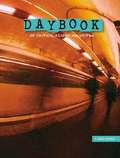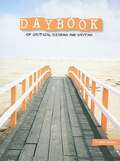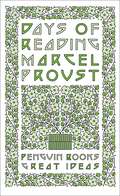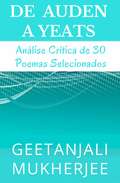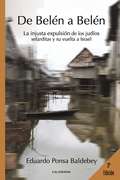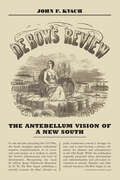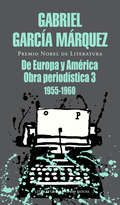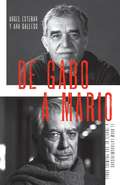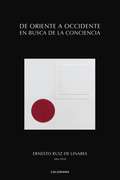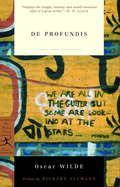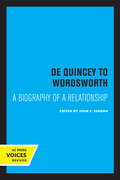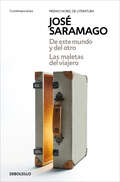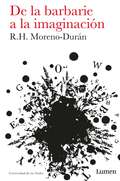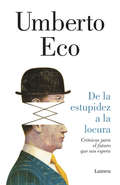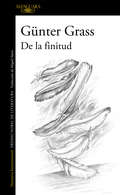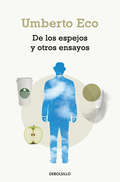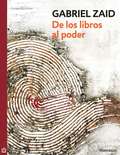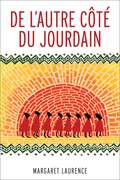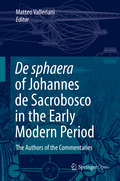- Table View
- List View
Daybook of Critical Reading and Writing [Grade 7]
by Fran Claggett Louann Reid Ruth VinzNIMAC-sourced textbook
Daybook of Critical Reading and Writing [Grade 8]
by Fran Claggett Louann Reid Ruth VinzNIMAC-sourced textbook
Days of Reading (Penguin Great Ideas)
by Marcel ProustIn these inspiring essays about why we read, Proust explores all the pleasures and trials that we take from books, as well as explaining the beauty of Ruskin and his work, and the joys of losing yourself in literature as a child. Throughout history, some books have changed the world. They have transformed the way we see ourselves – and each other. They have inspired debate, dissent, war and revolution. They have enlightened, outraged, provoked and comforted. They have enriched lives – and destroyed them. Now Penguin brings you the works of the great thinkers, pioneers, radicals and visionaries whose ideas shook civilization and helped make us who we are.
De Auden a Yeats: Análise Crítica de 30 Poemas Selecionados
by Geetanjali Mukherjee Allan Felipe Rocha PenoniEste livro é uma referência pronta para alunos de Literatura Inglesa que querem ajuda para navegar pela poesia de alguns dos maiores poetas do final do século XIX e do século XX. O livro contém análises críticas profundas de 30 poemas selecionados das obras de W.H. Auden, Ted Hughes, John Keats, Philip Larkin e W.B. Yeats. Uma coletânia de 30 ensaios, o livro objetiva ajudar que alunos de literatura tenham uma visão geral da vida e do trabalho de casa poeta representado, assim como entender os poemas discutidos com suficiente profundidade. CARACTERÍSTICAS DO LIVRO * Uma seção sobre a vida e o histórico de cada poeta, para melhor entender as influências em sua poesia, e ter uma visão do contexto dos poemas selecionados * Uma explanação simples de cada poema * Explanações dos temas, motivos e símbolos usados nos poemas * Um ensaio dedicado para cada poema selecionado, analisando-os para o benefício do estudante de literatura * Perguntas curtas para que os alunos pensem sobre os temas mais profundos dos poemas Este é um guia inestimável para de literatura inglesa na escola ou universidade, ou para qualquer um que deseje obter uma compreensão mais apurada de alguns dos poemas mais reconhecidos do último século. Este livro funciona melhor como um guia de estudos, e não deve substituir a leitura de fato dos poemas (POEMAS NÃO INCLUSOS). Alguns poemas discutidos: * W.H. Auden - Refugee Blues * Ted Hughes - Crow Tyrannosaurus * Philip Larkin - The Whitsun Weddings * John Keats - To Autumn * W.B. Yeats - The Second Coming
De Belén a Belén: La injusta expulsión de los judíos sefarditas y su vuelta a Israel
by Eduardo Ponsa BaldebeyUna historia sobre la injusta expulsión de los judíos sefarditas y su vuelta a Israel. <P><P> Tuve suerte. Sí. <P><P>Antes de un año de acabada la carrera, con el título en el bolsillo y además trabajando, me vinieron a buscar: «Eduardo, hay un trabajo muy especial para ti en Sudamérica, contratado por tres años. <P>Te encaja: defender el tema de una patente que los norteamericanos quieren recuperar». <P>Allí, en Brasil, Uruguay y Argentina, me percaté de que, dentro de las muchas personas que tuve que tratar, los judíos eran los más duros y hábiles a la hora de negociar. <P>Pero ¡cuidado!, estos eran extremadamente serios, correctos y cumplidores: una vez cerrado un trato ya era «trato cerrado», y eso se agradecía. Esta experiencia, y lo que siempre he tenido como injusta expulsión, me condujeron a escribir sobre ello. <P> De Belén a Belén es una historia familiar, ficticia, aplicable a muchas otras de las expulsadas que se fueron a Sudamérica y que, con los años, los más jóvenes, ahora, desean para volver a instalarse en Israel, pasando previamente por Toledo, la antigua y primera capital de lo que hoy día ya es la España de la Península Ibérica, de donde injustamente, insisto, tuvieron que marchar.
De Bow's Review: The Antebellum Vision of a New South (New Directions In Southern History Ser.)
by John F. KvachA study of the nineteenth-century magazine from the American South, its editor, and influence on the region.In the decades preceding the Civil War, the South struggled against widespread negative characterizations of its economy and society as it worked to match the North’s infrastructure and level of development. Recognizing the need for regional reform, James Dunwoody Brownson (J. D. B.) De Bow began to publish a monthly journal?De Bow’s Review?to guide Southerners toward a stronger, more diversified future. His periodical soon became a primary reference for planters and entrepreneurs in the Old South, promoting urban development and industrialization and advocating investment in schools, libraries, and other cultural resources. Later, however, De Bow began to use his journal to manipulate his readers’ political views. Through inflammatory articles, he defended proslavery ideology, encouraged Southern nationalism, and promoted anti-Union sentiment, eventually becoming one of the South’s most notorious fire-eaters.In De Bow’s Review: The Antebellum Vision of a New South, author John Kvach explores how the editor’s antebellum economic and social policies influenced Southern readers and created the framework for a postwar New South movement. By recreating subscription lists and examining the lives and livelihoods of 1,500 Review readers, Kvach demonstrates how De Bow’s Review influenced a generation and a half of Southerners. This approach allows modern readers to understand the historical context of De Bow’s editorial legacy. Ultimately, De Bow and his antebellum subscribers altered the future of their region by creating the vision of a New South long before the Civil War.“Kvach fills a surprising gap in the history of the nineteenth-century South with this elegantly written biography of the enigmatic J. D. B. De Bow. The work represents an important contribution to a growing historiography exploring the presence of a middle-class commercial culture in the pre–Civil War South and challenging long-held views of a static socioeconomic world of planters and plain folk.” —Bruce W. Eelman, author of Entrepreneurs in the Southern Upcountry: Commercial Culture in Spartanburg, South Carolina, 1845-1880“An insightful, original, deeply researched work of scholarship. Examining not only the career of journalist J. D. B. De Bow but also the readers who responded enthusiastically to his call for economic diversification, John F. Kvach helps us see the nineteenth-century South in a new way, undistorted by the stark, artificial line so many historians have drawn to separate the so-called Old South from the New.” —Stephen V. Ash, author of A Massacre in Memphis: The Race Riot That Shook the Nation One Year after the Civil War“DeBow was the antebellum South’s most prominent advocate of economic modernization and industrialization, and one of its most vitriolic secessionists. John Kvach explores this seeming paradox, and gives us as well a careful description of DeBow’s subscribers and followers.” —J. Mills Thornton, University of Michigan
De Europa y América: Obra periodística, 3 (1955-1960)
by Gabriel García MárquezEn esta tercera entrega de la obra periodística del autor encontramos un período de intensas experiencias políticas, de dinamismo ideológico, de enriquecimiento estilístico. De Europa y América (1955-1960) cierra el período más activo de García Márquez en el campo del periodismo: período de intensas experiencias políticas, de dinamismo ideológico, de enriquecimiento estilístico. De hecho, estaba todo dispuesto para el esfuerzo creativo que inmediatamente había de traducirse en las páginas de La mala hora (1962) y, un lustro más tarde, en las de su obra maestra, Cien años de soledad. En las crónicas y reportajes que García Márquez enviaba allende el Atlántico, desde Ginebra, Roma, Venecia, Viena, París, el lector perspicaz hallará innumerables presagios de la gran obra literaria que incubaba el consagrado narrador colombiano.
De Europa y América: Obra periodística, 3 (1955-1960)
by Gabriel García MárquezEn esta tercera entrega de la obra periodística del autor encontramos un período de intensas experiencias políticas, de dinamismo ideológico, de enriquecimiento estilístico. De Europa y América (1955-1960) cierra el período más activo de García Márquez en el campo del periodismo: período de intensas experiencias políticas, de dinamismo ideológico, de enriquecimiento estilístico. De hecho, estaba todo dispuesto para el esfuerzo creativo que inmediatamente había de traducirse en las páginas de La mala hora (1962) y, un lustro más tarde, en las de su obra maestra, Cien años de soledad. En las crónicas y reportajes que García Márquez enviaba allende el Atlántico, desde Ginebra, Roma, Venecia, Viena, París, el lector perspicaz hallará innumerables presagios de la gran obra literaria que incubaba el consagrado narrador colombiano.
De Gabo a Mario
by Ana Gallego Angel EstebanDos narradores extraordinarios, Gabo y Mario, el poeta y el arquitecto, Lennon y McCartney, el turco y el indio, protagonizan una de las amistades más férreas de toda la literatura universal. Esos mismos amigos, diez años más tarde, terminan su relación con una pelea que llega hasta los puños. Cobijados bajo sus alas, un conjunto de escritores, los mejores del continente latinoamericano, se reúnen, celebran, se escriben y viven juntos aventuras apasionantes. Las novelas más sobresalientes del siglo xx en español, los grandes premios literarios, los contratos millonarios, los congresos y las fiestas, las cartas, todo eso, y mucho más, es lo que llegó a conocerse como el boom de la literatura hispanoamericana. Una pléyade de autores y obras sin parangón en la lengua de Cervantes desde el primer Siglo de Oro. Las décadas de los sesenta y los setenta constituyeron, indudablemente, la segunda edición de una edad privilegiada para las letras hispánicas.
De Gabo a Mario: El Boom Latinoamericano A Través De Sus Premios Nobel
by Ángel EstebanDos narradores extraordinarios, Gabo y Mario, el poeta y el arquitecto, Lennon y McCartney, el turco y el indio, protagonizan una de las amistades más férreas de toda la literatura universal. Esos mismos amigos, diez años más tarde, terminan su relación con una pelea que llega hasta los puños. Cobijados bajo sus alas, un conjunto de escritores, los mejores del continente latinoamericano, se reúnen, celebran, se escriben y viven juntos aventuras apasionantes. Las novelas más sobresalientes del siglo xx en español, los grandes premios literarios, los contratos millonarios, los congresos y las fiestas, las cartas, todo eso, y mucho más, es lo que llegó a conocerse como el boom de la literatura hispanoamericana. Una pléyade de autores y obras sin parangón en la lengua de Cervantes desde el primer Siglo de Oro. Las décadas de los sesenta y los setenta constituyeron, indudablemente, la segunda edición de una edad privilegiada para las letras hispánicas.
De Oriente a Occidente en busca de la conciencia
by Ernesto Ruiz de Linares¿Exisrte en realidad la conciencia? <P><P>«Ernesto Ruiz de Linares y Santisteban (Burgos 1954) notario de profesión y "concienciologo" de vocación ha tendido el coraje de enfrentarse a una de las incógnitas más oscuras de nuestro tiempo; la naturaleza de la conciencia y sus múltiples interpretaciones. Interpretaciones que van desde el reconocimiento del mundo físico (física cuántica y teoría de cuerdas) al prolijo y fantástico mundo oriental.La primera muestra que se plantea el pensador es ¿existe en realidad la conciencia? o ¿es una abstracción fabricada por la mente del investigador? <P><P> La discusión no es baladí, pues detrás de esta dicotomía están conceptos de tanta gravedad como es la existencia de Dios, la concepción del Universo, la mortalidad del alma, o la finalidad de nuestra existencia. Ruiz de Linares utiliza el método histórico para trazar un punto entre los conceptos físicos aportados por la física cuántica y la neurobiología, y las doctrinas espiritualistas del mundo oriental. <P><P>Este puente que antaño parecía imposible de cruzar, ha permitido con el tiempo, y a medida que la ciencia ha avanzado acercarlas hasta el punto de que hoy en día se aproximan sus dos orillas, la una para hacerse más poética y la otra en opuesta dirección para hacerse más pragmática. No podemos resistirnos a recordar las palabras de García Loca "el hombre llega por medio de la poesía al límite donde el filósofo y el matemático vuelven la espalda en silencio". <P><P> La neurobiología actual ofrece argumentos para revalidar el postulado Zen de la multiplicidad de niveles diversos de conciencia, de tal forma que es más creíble hablar de conciencias múltiples en plural que de un concepto unitario de conciencia. El libro de Ruiz de Linares analiza con buen criterio científico el argumentarlo físico desde la orilla del llamando mundo occidental y su repercusión o conciliación con las doctrinas orientalistas. <P><P>Su lectura será apasionante para el lector interesado por este tema e imprescindible para el lector iniciático».Eduardo Varela de Seijas Slocker. Doctor en Neurología.
De Profundis
by Oscar Wilde1911. Wilde, Irish poet and dramatist whose reputation rests on his comic masterpieces Lady Wintermere's Fan and The Importance of Being Earnest. De Profundis was written from Wilde's prison cell at Reading Gaol to his friend and lover Lord Alfred Douglas. It explodes the conventions of the traditional love letter and offers a scathing indictment of Douglas's behavior, a mournful elegy for Wilde's own lost greatness, and an impassioned plea for reconciliation. At once a bracingly honest account of ruinous attachment and a profound meditation on human suffering. See other titles by this author available from Kessinger Publishing.
De Profundis and Other Writings
by Oscar Wilde'I have nothing to declare,' Wilde once told an American customs official, 'except my genius.' A good part of that genius is evident in the essays and poems included in this volume. There is the intellectual genius of "The Soul of Man under Socialism", in which he clearly foresaw the dangers of economic bureaucracy and state-worship: for Wilde, socialism meant liberation and individuality, not enslavement. Then there is the emotional genius of "De Profundis", the long, introspective and often hostile letter he addressed to Lord Alfred Douglas from prison. And there is the poetical genius of "The Ballad of Reading Gaol", in which Wilde's generous nature could movingly express for another's misery the sorrow he found it hard to express for his own. This collection contains, too, many examples of that humorous and epigrammic genius which captured the London theatre and which, by suddenly casting light from an unexpected angle, widened the bounds of truth. Show More Show Less
De Quincey to Wordsworth: A Biography of a Relationship
by John E. JordanThis title is part of UC Press's Voices Revived program, which commemorates University of California Press’s mission to seek out and cultivate the brightest minds and give them voice, reach, and impact. Drawing on a backlist dating to 1893, Voices Revived makes high-quality, peer-reviewed scholarship accessible once again using print-on-demand technology. This title was originally published in 1962.
De este mundo y del otro / Las maletas del viajero
by José SaramagoUn volumen que reúne dos libros de artículos de José Saramago, escritos entre 1968 y 1972 para el diario A Capital y el semanario Jornal do Fundão. Los dos libros agrupados en este volumen contienen artículos escritos con un lenguaje claro y directo, en los que se conjuga la reflexión, la observación y la crítica de temas muy diversos. De este mundo y del otro es una serie de crónicas breves acerca de la vida cotidiana y sus misterios. En Las maletas del viajero, Saramago habla de su niñez, su familia, sus vivencias y los engaños de la política, así como de la vida de las ciudades, el arte y los museos. En los dos casos, su prosa demuestra un fino humor y una ironía que invita a su lectura. El conjunto nos permite entrever a un escritor directo y cercano, que parece dialogar con sus lectores de viva voz.
De la Felicidad y todo eso
by Fernando Villegas DarrouyFernando Villegas está iluminado, radiante, en estado de gracia, por lo cual, bondadosamente, nos invita a pensar en nuestro bienestar. ¿Hay algo más importante acaso que superar los sentimientos que nos hacen ser negativos e infelices? Con un espíritu ligero, pues la seriedad «es un rasgo saturnino, pesado, meloso, pegajoso y a menudo estúpido y letal», el autor se pasea por todos los temas que considera importantes para lograr la ansiada felicidad. Y quienes lo acompañan son Epicuro, Zenón, Séneca, Schopenhauer, Bertrand Russell y otros pensadores de peso y gran fama, así como su abuelito, Alberto Villegas, quien con gran sabiduría solía decir: «¡A quién le va a importar esta huevada dentro de diez mil años!». De manera que, un tanto en broma y tres cuartos en serio, Villegas nos ofrece una serie de ensayos en miniatura que van desde cómo orinar para conseguir un momento de respiro y solaz hasta cómo sobrevivir a las ruedas incesantes del consumo y la ganancia. Un auténtico autoayuda, en la estela de Epicuro: «El que no considera lo que tiene como la riqueza más grande, es desdichado, aunque sea dueño del mundo».
De la barbarie de la imaginación
by Rafael Humberto Moreno DuranUn ensayo imprescindible sobre la evolución de la novela en América Latina y España. Para R.H. Moreno-Durán, la novela latinoamericana expresa la secuencia de factores, tendencias y modas que primaron en el panorama cultural del continente, y la imaginación es el único elemento que esta tiene para revelarse en medio del debate entre "civilización" y "barbarie", implícito en la problemática cultural latinoamericana. La crítica ha dicho "De la barbarie a la imaginación es una libre interpretación de las letras hispanoamericanas desde las perspectivas de un escritor presente". Ángel Rama, Novísimos narradores hispanoamericanos "El don del analista consiste en acertar con los conceptos esenciales, con aquellos que de manera explícita se juegan las partidas. Solo cuando tales conceptos se han aclarado, y Moreno-Durán lo consigue excepcionalmente, empieza el ejercicio de mirar cómo se mueven# El libro de Moreno-Durán es como Pascal decía que es el universo: una esfera cuyo centro se encuentra en cualquier parte". J. M. Carandell, Tele/Expres "El libro de Moreno-Durán no es solo un estudio de la narrativa hispanoamericana contemporánea, sino también un intento audaz de interpretación global de toda la cultura de América Latina". Journal of Spanish Studies
De la estupidez a la locura: Crónicas para el futuro que nos espera
by Umberto EcoLa obra póstuma de Umberto Eco, que el autor entregó a imprenta pocos días antes de morir, es una selección de artículos inéditos en España, seleccionados por él mismo. Una sucesión de pequeños placeres intelectuales. «Cuando yo era joven, había una diferencia importante entre ser famosos y estar en boca de todos. La mayoría querían ser famosos por ser el mejor deportista o la mejor bailarina, pero a nadie le gustaba estar en boca de todos por ser el cornudo del pueblo o una puta de poca monta# en el futuro esta diferencia ya no existirá: con tal de que alguien nos mire y hable de nosotros, estaremos dispuestos a todo.» Estas palabras son un buen ejemplo de lo que nos ofrece De la estupidez a la locura, una serie de artículos que Umberto Eco publicó en prensa a lo largo de quince años y seleccionó personalmente poco antes de dejarnos. Por estas piezas se pasean hombres y mujeres de relevancia internacional, pero también algunos de los personajes de ficción más amados por Eco, como James Bond o los protagonistas de algunos de sus cómics favoritos. Y vuelve, como siempre, la nostalgia por el pasado perdido, la reflexión irónica sobre el poder y sus instrumentos, y la crítica a un consumismo que nos deja llenos de objetos y vacíos de ideas. Genio, sabiduría y sentido del humor: de todo hay en este libro, una despedida digna de un gran maestro.
De la finitud
by Günter GrassDe la finitud es el libro póstumo, la despedida del Premio Nobel de Literatura y Premio Príncipe de Asturias, Günter Grass. «Günter Grass nos ha dejado un conmovedor regalo de despedida. Creo que una vez más consiguió algo grande. Ha creado con su última obra de arte un impresionante juego de poesía, prosa e ilustración.»Gerhard Steidl (editor de Günter Grass) Entre diario, ensayo y poesía, y profusamente ilustrado por él mismo, De la finitud es el libro que Günter Grass escribió durante sus últimos años. En él hallamos la lúcida mirada, alejada de toda melancolía, de un hombre que se enfrenta a la muerte con ironía, en poemas como «Autorretrato» o «Adiós a la carne», al tiempo que sigue analizando el mundo que le rodea. Desfilan bajo su pluma llena de sabiduría, lirismo y humor los hechos y personajes más diversos, desde la crisis griega («La luz al final del túnel») ala canciller Angela Merkel («Mamá»). Un delicado regalo de despedida, un libro imprescindible. Reseñas:«Es un libro para la reflexión serena y el placer por las cosas profundas y bien hechas [...]. No todo el mundo sabe irse de la vida sin amargura, dejando a sus congéneres, a modo de propina literaria, un obsequio como este De la finitud.»Fernando Aramburu, El Mundo «Günter Grass escribió un último libro poético y conmovedor, íntimo y político, necesario. Uno de sus mejores libros.»Patricio Pron, Babelia «Un texto póstumo a modo de despedida preparado con mimo por el autor hasta sus últimos detalles... La constatación de la decadencia física se da la mano con una fuerte dosis de humor negro.»Elena Hevia, El Periódico de Catalunya «De la finitud es la última expresión viva de uno de los magos de un idioma mágico, el alemán.»Luis Meana, ABC Cultural «De la finitud es el mejor libro de Grass en años. Su muerte deja una obra distinta a todas las demás.»Jens Dirksen, Hamburger Abendblatt «Es una obra conmovedora y por momentos encantadora.»Heinrich Detering, Presidente de la Academia Alemana de Lengua y Literatura «De la finitud es una sólida obra póstuma de poesía, prosa y dibujos. Melancólico pero nunca sentimental. La franqueza de Günter Grass es admirable.»Friedmar Apel, Frankfurter Allgemeine «Una despedida llena de humor. El libro como una obra de arte, el libro como un libro, el último de Grass. Se ve el rastro de un hombre viejo que ha luchado ya sus batallas.»Volker Weidermann, Spiegel «Su último libro es francamente conciliador. De la finitud no es moralizador, es inusualmente autocrítico.»Burkhard Müller, Süddeutsche Zeitung «De la finitud es íntimo, melancólico, fanfarrón y alegre.»Matthias Hoening, Stern «Una obra de arte. De la finitud está lleno de una sensibilidad inusual y de una sana dosis de ironía y humor.»Jochen Kürten, DW. com
De los espejos y otros ensayos (Palabra En El Tiempo Ser.)
by Umberto EcoUna muestra brillante y sugestiva de la inagotable curiosidad intelectual de Umberto Eco. El volumen que presentamos agrupa, en torno a cinco grandes núcleos temáticos, artículos y ensayos de muy diversa procedencia. Dedicado al análisis de problemas de estética, a la interpretación de fenómenos de la cultura de masas, a la lectura crítica de textos literarios y al comentario de problemas filosóficos y semióticos de interés en nuestro tiempo, este libro es una muestra brillante y sugestiva de la inagotable curiosidad intelectual de Umberto Eco. Reseña:«Umberto Eco es un cultísimo ensayista que trabaja desde una ciencia tan plural como la semiótica, y un novelista que de algún modo plantea en cada título lo que pudiéramos decir una "novela-ensayo".»Luis Antonio de Villena
De los libros al poder
by Gabriel ZaidNueva edición, corregida y aumentada, de De los libros al poder, de Gabriel Zaid. En 1932, Alfonso Reyes veía en el mundo "un paulatino advenimiento al poder de las clases universitarias". Y así fue en México, donde la oligarquía revolucionaria cedió voluntariamente el poder a una nueva oligarquía universitaria. Para 1987, según el Diccionario biográfico del gobierno mexicano, de los 1,156 funcionarios más altos del poder ejecutivo, el 98% tenía licenciaturas (más de la mitad en la UNAM) y el 48% postgrados (más de la mitad en el extranjero). El 70% tenía experiencia académica (docencia, investigación) y el 30% había publicado libros. "Veblen intuyó que las diferencias económicas eran mucho menos radicales que las establecidas con base en la educación. Y en nuestro tiempo han sido Bourdieu y Sennett, Illich y Zaid quienes han argumentado que la teórica accesibilidad de todos al saber y la cultura tendía más a reforzar las diferencias de origen y de clase que a compensarlas."Xavier Rubert de Ventós,El laberinto de la hispanidad. Del material de este libro (corregido y aumentado para esta nueva edición) se han publicado glosas, reproducciones, traducciones, comentarios, réplicas y referencias en un centenar de libros y varios centenares de artículos publicados en Berlín, Bogotá, Buenos Aires, Londres, Los Ángeles, Madrid, México, Milán, Nueva York, París, Roma, Sâo Paulo, Washington y otras partes.
De l’autre côté du Jourdain (Traduction littéraire)
by Margaret LaurenceGhana, 1956. Nous sommes à la veille de l’indépendance. Nathaniel Amegbe est professeur dans une école ghanéenne plutôt médiocre. Johnnie Kestoe est comptable dans une firme textile britannique à Accra. Les deux hommes s’affronteront autour de la question de l’« africanisation », cette politique de passation des responsabilités entre Britanniques et Ghanéens. De l’autre côté du Jourdain est le premier roman de Margaret Laurence, cette matriarche de la littérature. Cette traduction est une invitation à découvrir une facette méconnue de l’œuvre d’une grande écrivaine qui, pendant son séjour en Afrique de 1950 à 1956, a su capter tout l’espoir et les bouleversements imposés par les indépendances africaines à l’ordre du monde. Mais avant tout, il s’agit d’une invitation à découvrir une Afrique fébrile, des personnages attachants, le tout écrit avec un talent incontestable, dans une pluralité de voix à couper le souffle. Réflexion sur l’indépendance, tant intérieure que politique, De l’autre côté du Jourdain annonçait déjà les grands romans emblématiques de Laurence, dont, L’ange de pierre et Les devins. Publié en français
De sphaera of Johannes de Sacrobosco in the Early Modern Period: The Authors of the Commentaries
by Matteo VallerianiThis open access book explores commentaries on an influential text of pre-Copernican astronomy in Europe. It features essays that take a close look at key intellectuals and how they engaged with the main ideas of this qualitative introduction to geocentric cosmology. Johannes de Sacrobosco compiled his Tractatus de sphaera during the thirteenth century in the frame of his teaching activities at the then recently founded University of Paris. It soon became a mandatory text all over Europe. As a result, a tradition of commentaries to the text was soon established and flourished until the second half of the 17th century. Here, readers will find an informative overview of these commentaries complete with a rich context. The essays explore the educational and social backgrounds of the writers. They also detail how their careers developed after the publication of their commentaries, the institutions and patrons they were affiliated with, what their agenda was, and whether and how they actually accomplished it. The editor of this collection considers these scientific commentaries as genuine scientific works. The contributors investigate them here not only in reference to the work on which it comments but also, and especially, as independent scientific contributions that are socially, institutionally, and intellectually contextualized around their authors.
